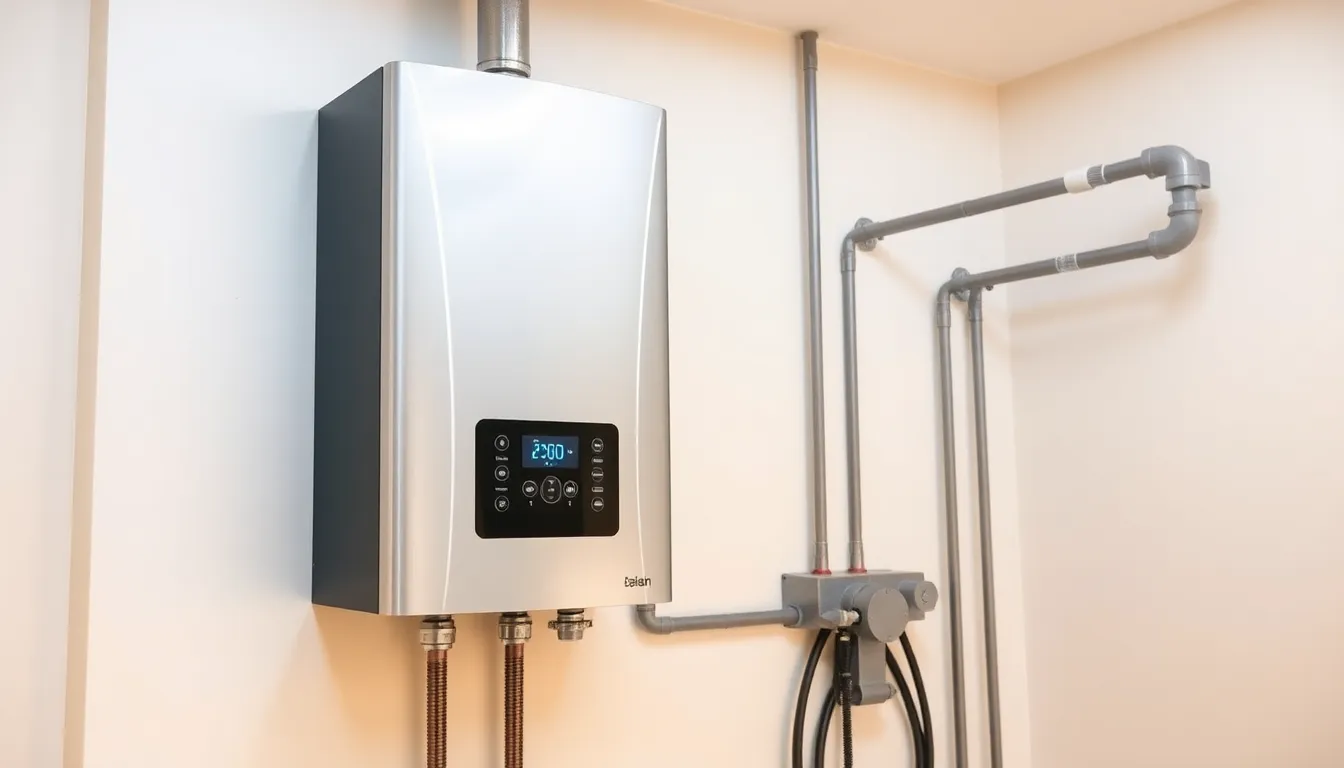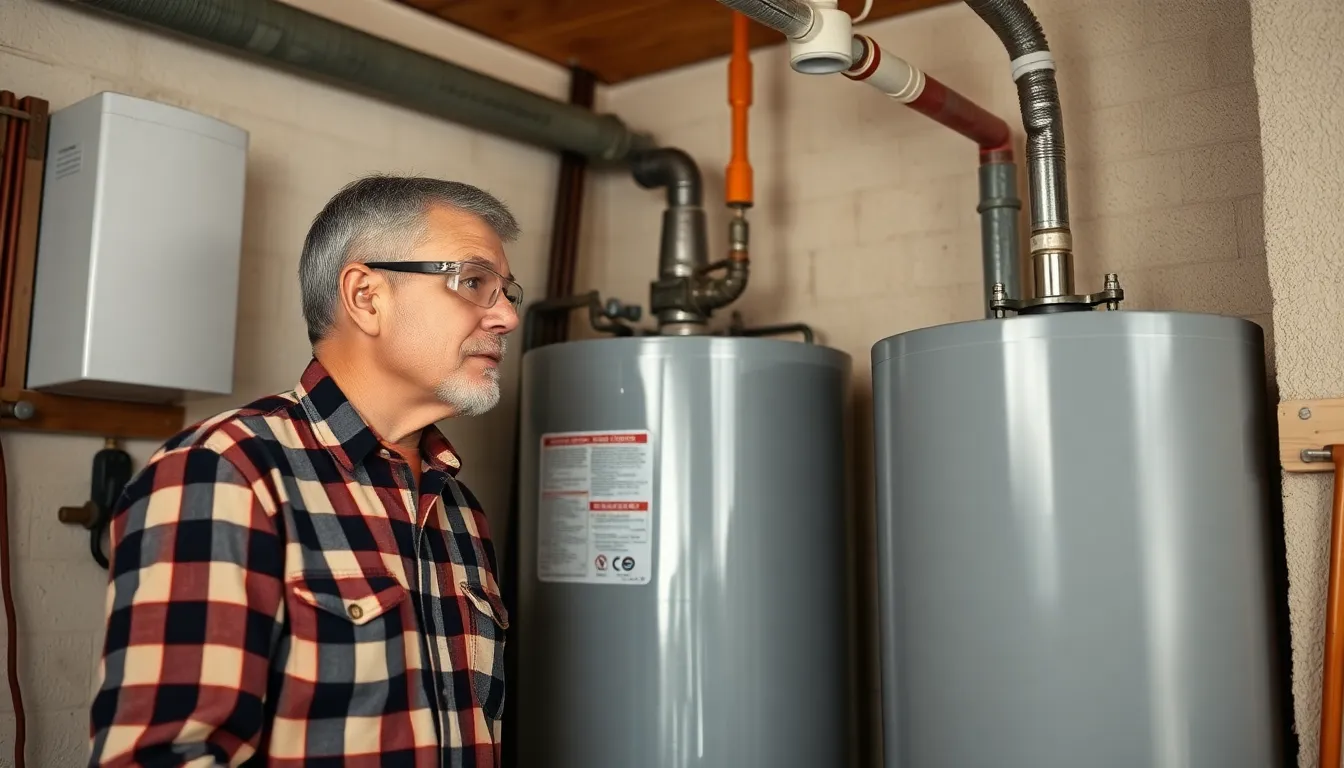Table of Contents
ToggleReplacing a water heater can feel overwhelming, especially with so many options and costs involved. Homeowners often wonder about the average cost to replace this essential appliance, which plays a crucial role in daily comfort. Understanding these costs can help in making informed decisions and budgeting effectively.
Factors like the type of water heater, installation complexity, and local labor rates can all influence the final price. Whether it’s a traditional tank model or a modern tankless system, knowing what to expect can ease the stress of the replacement process. This guide will break down the average costs and considerations, ensuring homeowners are well-prepared for their next steps.
Overview of Water Heaters
Water heaters serve the essential purpose of providing hot water for residential use. They come in various types, each with specific characteristics that affect performance, efficiency, and cost.
- Storage Tank Water Heaters: Storage tank models store a significant volume of heated water, usually ranging from 20 to 80 gallons. These units heat water continuously and typically operate on electricity, natural gas, or propane.
- Tankless Water Heaters: Tankless systems offer hot water on-demand, eliminating the need for a storage tank. They have a longer lifespan and higher energy efficiency compared to storage models. Flow rates can reach 2 to 5 gallons per minute.
- Heat Pump Water Heaters: Also known as hybrid water heaters, these units use electricity to transfer heat from the air or ground to heat water. Heat pump models are energy-efficient, and their usage can reduce electric bills by 50% compared to traditional electric water heaters.
- Solar Water Heaters: Solar models utilize solar panels to absorb energy from sunlight for heating water. Although they offer eco-friendly benefits and reduce energy costs in the long run, initial installation costs and weather dependency can be drawbacks.
- Indirect Water Heaters: Indirect systems heat water using a home’s space heating system. These units generally maintain a higher efficiency rating if connected to high-efficiency home heating.
Understanding the various water heater types helps homeowners choose the model that fits their needs and budget effectively. Factors like energy source, capacity, and installation location determine the best option for hot water supply.
Factors Influencing Cost

Several key factors impact the overall cost of replacing a water heater. Understanding these can help homeowners budget effectively and select the right model.
Type of Water Heater
Type of water heater significantly affects the cost. Storage tank models tend to be less expensive upfront but may incur higher energy costs over time. Tankless systems, which provide hot water on demand, typically cost more initially but offer long-term savings on energy bills. Heat pump water heaters, which transfer heat from the environment, carry a higher price tag due to advanced technology but can yield significant energy savings. Solar water heaters involve substantial installation expenses yet can drastically lower utility costs when used effectively. Indirect water heaters may vary in price based on the home’s heating system but often provide efficient hot water solutions.
Installation Complexity
Installation complexity plays a critical role in determining total replacement costs. Simpler installations, such as replacing a water heater in the same location, incur lower labor costs. However, moving a unit or upgrading to a different model may require additional plumbing or electrical work, increasing labor expenses. Special considerations, such as venting requirements for gas units or modifications to accommodate a heat pump, also add to installation complexity, leading to higher costs.
Local Labor Costs
Local labor costs greatly vary by region and market conditions. Urban areas often experience higher rates than rural locations. Homeowners should expect to pay additional fees for licenses and permits, which can differ based on local regulations. Researching regional labor costs can provide insight into expected expenses, enabling better budgeting for the overall replacement process.
Average Cost Breakdown
Understanding the average cost breakdown of water heater replacement helps homeowners make informed financial decisions. This section outlines the primary components influencing overall expenses.
Purchase Price
The purchase price varies based on the type of water heater. Typical costs are as follows:
| Water Heater Type | Average Price Range |
|---|---|
| Storage Tank | $300 – $1,500 |
| Tankless | $1,000 – $3,000 |
| Heat Pump | $1,500 – $3,500 |
| Solar | $5,000 – $8,000 |
| Indirect | $1,000 – $2,500 |
Storage tank models represent the lowest initial investment, while solar and heat pump types demand a higher upfront expenditure. Homeowners should consider efficiency ratings and long-term savings when evaluating these purchase prices.
Installation Fees
Installation fees hinge on complexity and location. Typical costs are:
| Installation Scenario | Average Cost |
|---|---|
| Basic Replacement | $200 – $600 |
| Moderate Upgrades (venting, etc.) | $600 – $1,200 |
| Complex Installations (relocation) | $1,200 – $2,000 |
Basic installations involve replacing existing units with minimal changes. Moderate upgrades may include adjustments for venting systems, while complex installations often entail relocating plumbing or electrical work, affecting labor intensity and overall cost.
Additional Expenses
Additional expenses can arise during the replacement process. Common fees include:
| Additional Expense | Average Cost |
|---|---|
| Permits | $50 – $150 |
| Cleanup Fees | $50 – $100 |
| Extended Warranties | $100 – $500 |
Permits may be necessary based on local regulations. Cleanup fees cover debris removal after installation. Homeowners often opt for extended warranties to protect against future repairs, which adds to the total budget.
Comparing Different Water Heater Types
Homeowners should analyze the features, benefits, and costs of various water heater types to make an informed decision. Here’s a breakdown of common options:
Traditional Water Heaters
Traditional water heaters, or storage tank heaters, operate by heating and storing water in a tank. Capacities typically range from 20 to 80 gallons. Average costs for units range from $300 to $1,500, depending on brand and size. Installation fees can add another $200 to $600. Although upfront costs are lower, energy efficiency can be a concern, as they continuously heat water, leading to higher utility bills.
Tankless Water Heaters
Tankless water heaters provide hot water on demand, which can enhance energy efficiency. These units typically last longer than traditional models, with lifespans averaging 20 years. Purchase prices range from $1,000 to $3,500, with installation expenses ranging from $800 to $2,000. Although initial costs are higher, they can deliver savings on energy bills, particularly for households with moderate to high hot water demand.
Heat Pump Water Heaters
Heat pump water heaters utilize electricity to move heat from the air or ground to heat water. They commonly boast energy efficiency ratings of up to 300%. Initial expenses for heat pump models range from $1,500 to $4,000, with installation costs typically between $500 and $1,500. While they require a higher upfront investment, they can drastically reduce energy costs over time, making them a viable option for environmentally conscious homeowners.
Cost-Saving Tips
- Choose the right water heater: Selecting the most efficient water heater type contributes significantly to long-term savings. Opt for energy-efficient models such as tankless or heat pump systems, which reduce utility bills.
- Take advantage of local incentives: Look for rebates or tax credits available in the area for energy-efficient water heater installations. Many utility companies offer financial incentives to promote energy-saving appliances.
- Consider professional installation: Hiring a qualified technician may seem expensive, yet improper installation can lead to future costs. Professionals ensure that water heaters operate efficiently, lowering energy costs over time.
- Schedule regular maintenance: Routine maintenance, like flushing the tank annually, prevents sediment buildup and prolongs the life of the water heater. Extended equipment life translates to cost savings in the long run.
- Minimize hot water usage: Implementing water-saving fixtures, such as low-flow showerheads, can reduce the demand for hot water, which consequently lowers energy consumption and costs.
- Invest in an insulation blanket: Insulating the water heater tank can minimize heat loss. This simple addition can improve efficiency and reduce energy bills up to 10%.
- Compare prices: Shopping around for both equipment and installation costs ensures homeowners find the best deals. Getting multiple quotes from local contractors aids in identifying competitive pricing.
- Monitor energy usage: Using smart home technology to track hot water usage helps identify patterns and areas where savings are possible. By analyzing usage data, homeowners can adjust habits to save on energy costs.
By incorporating these cost-saving tips, homeowners can significantly reduce the financial burden associated with replacing and operating a water heater.
Replacing a water heater is a significant investment for homeowners. Understanding the average costs and the factors that influence them can make the process smoother. By evaluating different types of water heaters and their associated expenses, homeowners can select the best option for their needs and budget.
With careful planning and consideration of installation complexities, it’s possible to make informed choices that lead to long-term savings. Utilizing energy-efficient models and taking advantage of local incentives can further reduce costs. Ultimately, being well-informed empowers homeowners to navigate the replacement process confidently and efficiently.





